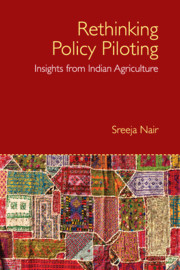Book contents
- Frontmatter
- Contents
- List of Figures and Tables
- Acknowledgements
- List of Abbreviations
- 1 Rethinking Policy Pilots in the 21st Century
- 2 The Context of Indian Agriculture for Piloting
- 3 A Landscape of Agriculture Policy Pilots
- 4 A Qualitative Comparative Analysis of Policy Pilots
- 5 From Piloting to Policy: Lessons and the Path Ahead
- Appendix A
- Appendix B
- Index
5 - From Piloting to Policy: Lessons and the Path Ahead
Published online by Cambridge University Press: 06 August 2021
- Frontmatter
- Contents
- List of Figures and Tables
- Acknowledgements
- List of Abbreviations
- 1 Rethinking Policy Pilots in the 21st Century
- 2 The Context of Indian Agriculture for Piloting
- 3 A Landscape of Agriculture Policy Pilots
- 4 A Qualitative Comparative Analysis of Policy Pilots
- 5 From Piloting to Policy: Lessons and the Path Ahead
- Appendix A
- Appendix B
- Index
Summary
Summary of Insights on Policy Piloting
Policy experimentation and piloting can play a pivotal role in exploring innovative solutions to the policy problems of the 21st Century. These have been acknowledged as promising tools to help policymakers navigate uncertainties in the future policy context. However, there are several challenges in realizing their potential to do so in practice. Addressing these challenges ask for a deeper understanding of the design of policy experiments and pilots, their evolution and development and potential mainstreaming into routine policymaking.
The terms ‘policy experimentation’ and ‘piloting’ are not bound by watertight classifications. Pilots are considered as an advanced form of experimentation and may or may not be preceded by an observable experimental stage. There is little contestation on the value experimentation and piloting can bring for enabling improved policy designs. This is evident in the calls for experimentation and piloting to be an integral part of regular policymaking; some suggesting that policies should be always launched as pilots before scaling up to larger programmes (Sovacool 2012) or be in a constant state of piloting (Tomar and Swanson 2009).
Pilots are launched for a variety of purposes with variations on the reason for piloting, clarity in intended outcomes prior to launching the pilot (if any), agency or agencies launching the pilot, and governing the pilot's design and implementation to name a few.
Policy experiments and pilots can provide government agencies with a low-risk and effective policy tool to provide insights on the expected performance of a proposed policy change before implementing it fully (Tassey 2013). As a mode of exploring policy alternatives, experiments and pilots can increase the chances of achieving effective outcomes under uncertainty (Swanson and Bhadwal 2009). Designing well-planned pilots to be operational alongside a fully-functioning policy can help to test a policy's performance along with the identification of emerging issues and make necessary policy adjustments (Swanson and Bhadwal 2009). A pilot in this sense forms an important first step of regular policy monitoring and evaluation (Jowell 2003).
Studies on experiments and pilots conducted by non-governmental agencies such as NGOs, the private sector, donors, and research institutes are routinely encountered in literature on scaling-up, often as one-off evaluations of their effectiveness. In comparison, there has been a lack of systematic evaluation of similar efforts by governmental agencies.
- Type
- Chapter
- Information
- Rethinking Policy PilotingInsights from Indian Agriculture, pp. 134 - 150Publisher: Cambridge University PressPrint publication year: 2021



